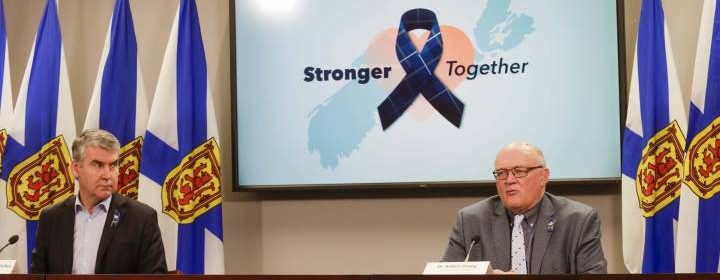Coronavirus: Nova Scotia announces 20 new cases, additional death at Northwood

There has been another death connected to COVID-19 at Northwood Manor in Halifax, bringing the total number of deaths at the facility to 22 and the provincial total to 28.
“On behalf of all Nova Scotians, I extend my heartfelt condolences to the family and loved ones of this individual,” said Premier Stephen McNeil in a statement.
“We will continue to work diligently with our partners to make sure we do everything we can to protect residents and staff at Northwood and all of our long-term care homes from this terrible disease.”
The province also announced there are now 227 residents in Nova Scotia long-term care homes who have tested positive, up nine from Tuesday.
20 new cases, 935 total
The province announced 20 new cases of COVID-19 on Wednesday, bringing the provincial total to 935. Of the 935 cases, 378 are active. That’s an increase of 12 active cases from Tuesday.
[ Sign up for our Health IQ newsletter for the latest coronavirus updates ]
All of the new cases were identified in Nova Scotia’s central health zone. Here is a breakdown of where all of the province’s COVID-19 cases have been identified by health zone:
- Central: 792
- Western: 54
- Eastern: 50
- Northern: 39
There are now 529 Nova Scotians who have recovered from COVID-19. That’s an increase of seven from Tuesday.
The age group most impacted by COVID-19 in Nova Scotia is those between 40 and 59.
The QEII Health Sciences Centre’s microbiology lab completed 905 Nova Scotia tests on Tuesday. In total, 27,486 tests have come back negative in Nova Scotia.
Premier Stephen McNeil and chief public health officer Dr. Robert Strang will be holding a COVID-19 press briefing Wednesday at 3 p.m.
Questions about COVID-19? Here are some things you need to know:
Health officials caution against all international travel. Returning travellers are legally obligated to self-isolate for 14 days, beginning March 26, in case they develop symptoms and to prevent spreading the virus to others. Some provinces and territories have also implemented additional recommendations or enforcement measures to ensure those returning to the area self-isolate.
Symptoms can include fever, cough and difficulty breathing — very similar to a cold or flu. Some people can develop a more severe illness. People most at risk of this include older adults and people with severe chronic medical conditions like heart, lung or kidney disease. If you develop symptoms, contact public health authorities.
To prevent the virus from spreading, experts recommend frequent handwashing and coughing into your sleeve. They also recommend minimizing contact with others, staying home as much as possible and maintaining a distance of two metres from other people if you go out.
For full COVID-19 coverage from Global News, click here.
Source: Read Full Article
